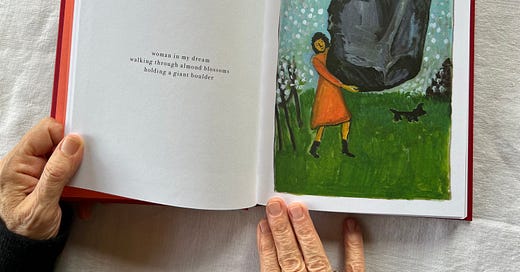The majority of caring in our homes and communities lands in the boughs, and on the backs of women. According to the Workplace and Gender Equality Agency, 7/10 carers in Australia are women.
Carers for the purpose of this article are people who provide unpaid care and support to family members and friends who live with a disability, mental health, chronic condition, life-limiting illness, an alcohol or other drug issue, or who are frail/aged.
Carers are an integral part of Australia’s health system and are the foundation of our aged, disability, palliative and community care systems.
Australian carers provide 2.2 billion hours of informal care each year with the cost of replacing this care valued at $77.9 billion.
Senator the Hon Katy Gallagher, Minister for Women says it will take 26 years to close the gender pay gap; so as Australia chips away at that remaining 21.7% divide, there is also invitation for Australian communities to redistribute the tasks of caring.
Artist, designer, and author Maira Kalman poses “What do women hold? The home and the family. And the children and the food. The friendships. The work. The work of the world. And the work of being human. The memories. And the troubles. And the sorrows and the triumphs. And the love.
Women also carry their declining health. Whilst women carry more than their share of caring responsibilities, their health is at risk. Dementia is now the leading cause of death for women in Australia. Diagnosis may come late because women are busy holding things; women are growing sicker for longer and there are are simply not enough Govt supports to support the health and wellbeing of people and communities.
Australia is getting older, faster. By 2026, more than 22 percent of Australians will be aged over 65. Caring is the role of family, neighbours, cultural, and spiritual communities. The role of caring for each other needs to stretch beyond women.
Workplace Gender Equality Agency says: The peak age for a female carer is 55, which is a time in life when many women may have recently transitioned out of child rearing only to assume caring responsibilities for a relative or friend. Conversely, the number of male carers peaks at age 75, which coincides with the Australian retirement age.
A husband who had been caring for his wife who lives with Alzheimer’s said “I would rather work. I really don’t like being a carer. I’d rather it be someone else’s problem. Being a carer, you just get forgotten.”
If 71.8% of carers are women, there are far too many ‘forgotten’ women.
Kalman’s vibrant book called Women Holding Things is a way of acknowledging women. It’s a collection of words and paintings; a moving meditation on the beauty and complexity of women’s lives and roles, revealed in the things they hold. She says:
One day at a Farmers Market, I saw a woman carrying an absolutely gigantic cabbage. It made me think of all the things women hold literally and metaphorically.
Balloons and grudges, and heavy loads and cabbages. And stupendous love and courage and a pink ukulele under a cherry tree. And from this a book was formed “Women Holding Things”.
Sometimes when I’m feeling particularly happy or content I think I can provide sustenance for legions of human beings. I can hold the entire world in my arms. Other times I can barely cross the room. And I drop my arms frozen, There is never an end to holding and certainly there is often the feeling of never doing enough.
Why is it when women are doing the majority of the caring work that the feeling is of ‘too little, not enough’? Caring for each other must be more equitably redistributed.
The monumental societal change as Australia ages will reshape workplaces, national and household finances and the structure of communities.
Australia requires over 285,000 workers for aged care, disability and mental health support by 2050 - I wonder how many of those will be women. It feels important to note that Government interventions alone will not be enough to improve our quality of life as we require more supports to live well.
Professor Samar Aoun, Western Australia’s Australian of the Year 2023, says “Because of the way our health systems (are done), the bureaucracy, the risk aversion. We really need to get back the passion in compassion.”
There is an invitation for people to participate, sharing the load is vital to sustainably caring for each other.
Caring doesn’t need to come at the cost of your own self-care, it’s possible to do both when the tasks are shared. The experience of caring can feel reciprocal when it is sustainably managed; the gifts offered in caring are immeasurable.
With so many women caring, all you need to do is pay attention or ask a woman you know how to support her. Caring for carers is vital, but that’s another article.
Refs:
Maira Kalman
Workplace Gender Equality
Progress to Close the Gender Pay Gap
The lonely, stressful work of looking after loved ones
Confronting ageing: the talk Australia has to have
Australian Home Funerals Alliance
Compassionate Communities Australia




